Jennifer Lansford told Newsweek in a previous interview that students who end up dropping out of high school could face adverse ramifications well into adulthood, pointing to her research.
Marcos Rangel has been appointed scientific director of the North Carolina Education Research Data Center (NCERDC), housed in the Center.

In this newly established role, Rangel will develop a broader scientific agenda for the NCERDC and update the data center’s infrastructure to catalyze future research and policy drawing on the data center’s resources.
“The NCERDC is a treasure trove of data that has led to groundbreaking research discoveries and research-based education policy recommendations,” says Jennifer Lansford, director of the Center for Child and Family Policy. “We are thrilled to have Marcos at the scientific helm as we innovate to bring the data center to a new level of impact.”
On April 18, the Center for Child and Family Policy (CCFP) hosted the School Research Partnership's annual spring event, featuring student poster presentations and an expert panel on Early Care & Education in North Carolina: Pressing Challenges and Future Directions in the Aftermath of COVID-19.
Leslie Babinksi, director of the School Research Partnership, gave opening remarks and introduced panelists, who included:
- Theresa Roedersheimer, M.Ed., Senior Early Childhood Policy Advisor at the North Carolina Division of Child Development and Early Education, NC DHHS;
- Holly Hickson, M.A., Deputy Director for Early Learning at the Hunt Institute;
- Karen Rhinehardt, M.Ed., Early Childhood Consultant at Prenatal to Five Fiscal Strategies;
- Elizabeth Snyder-Fickler, Ph.D., Senior Research Scientist at CCFP, and
- Carmen Alban, Senior Program Coordinator at CCFP.
During their discussion, panelists described the current early care and education landscape in North Carolina and the strengths and challenges described by parents and caregivers as part of the North Carolina’s Preschool Development (Birth Through Five) Needs Assessment. They also covered national trends in early care and education, as well as current priorities and activities of the North Carolina Division of Child Development and Early Education supporting parents and caregivers across the state.
Duke students (pictured below) in the Child Policy Research Certificate program and Jacqueline Morris Fellows presented posters of their research projects as part of the event.
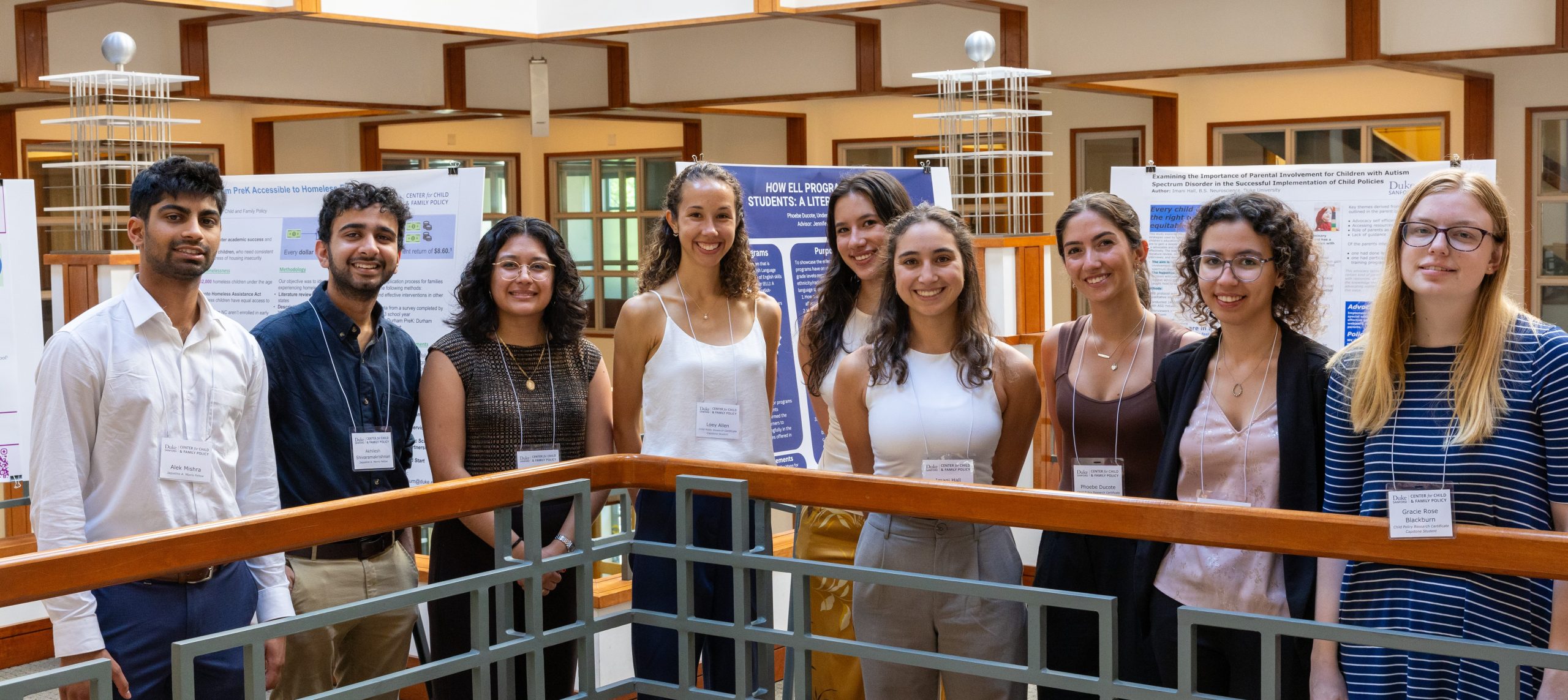
From left to right: Alek Mishra, Akhilesh Shivaramakrishnan, Samantha Rubalcava, Loey Allen, Alissa Rivero, Imani Hall, Phoebe Ducote, Kenza Slaoui, and Gracie Blackburn
Students shared the following reflections on their experience showcasing their research, engaging with community and school leaders, and hearing from panelists.
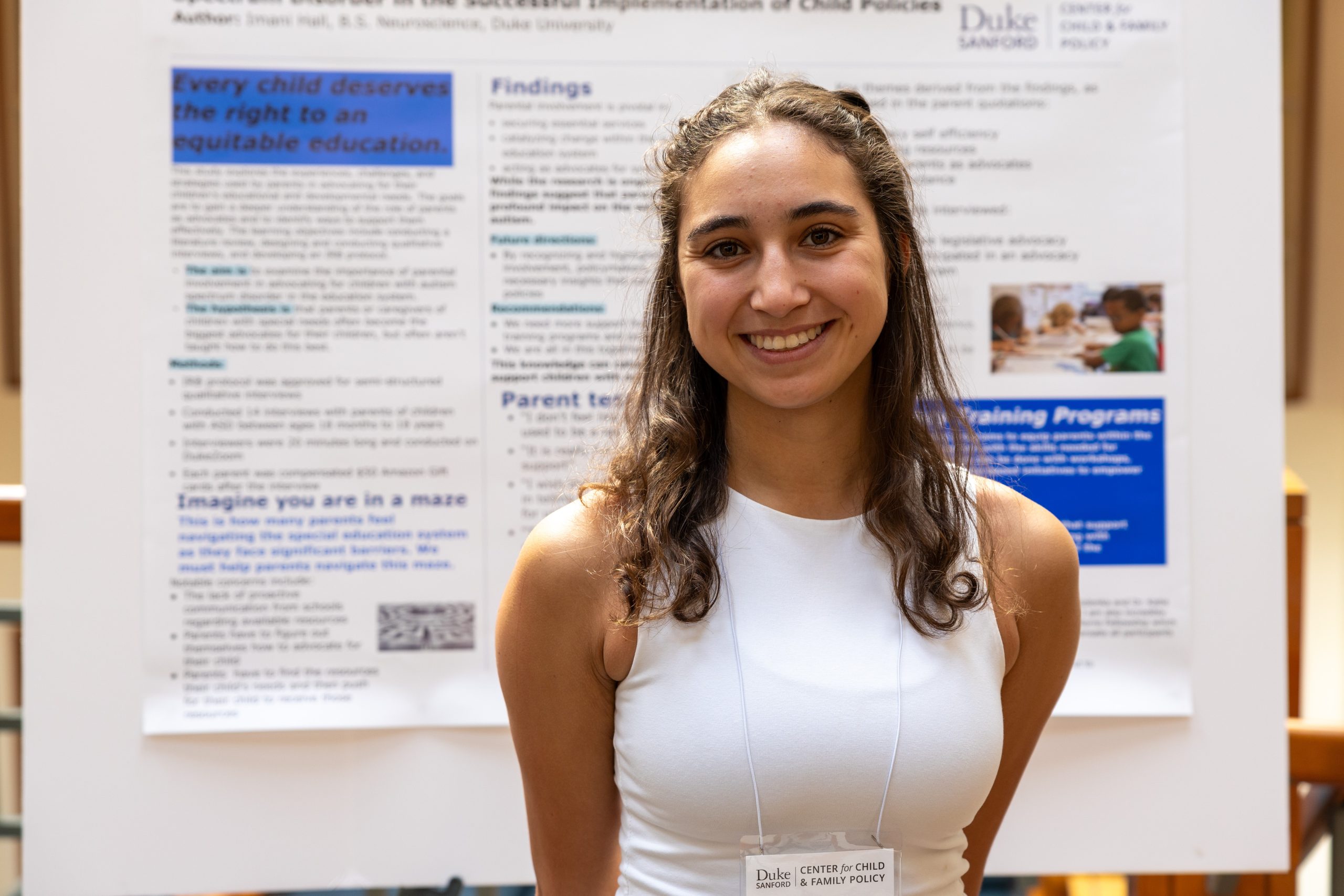
I had the privilege of presenting my poster to the CCFP staff, faculty, and collaborators last week. The engaging discussions with fellow researchers and stakeholders highlighted the importance of collaboration in developing impactful policies for children and families. It was incredibly inspiring to see my classmates and other Morris Fellows showcase their diverse projects, demonstrating the wonderful research being done within our community. Personally, the opportunity to present my work felt meaningful and reinforced my dedication to advocating for the welfare of children.
Imani Hall, Jacqueline A. Morris Fellow and Certificate graduate '24
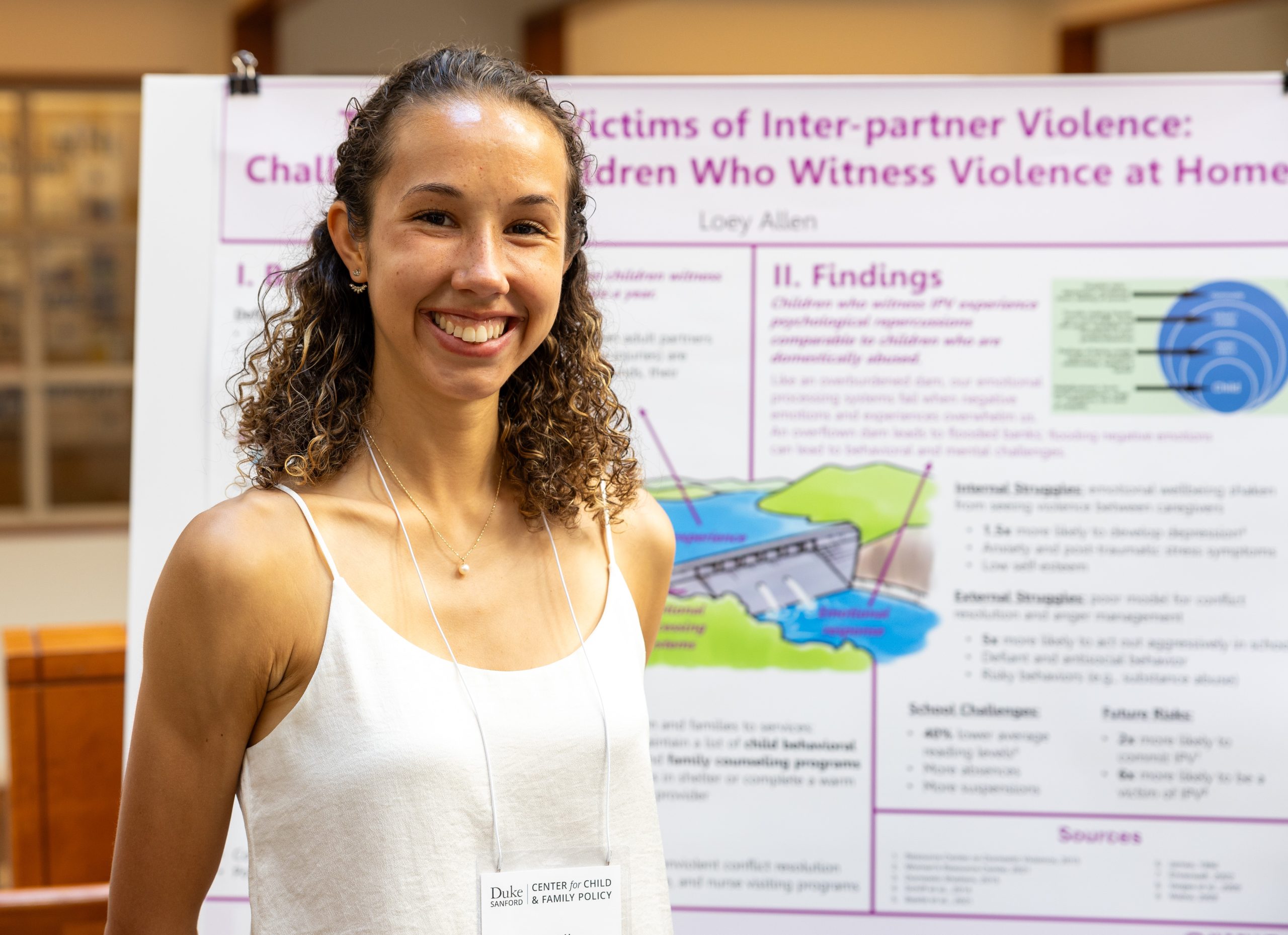
I enjoyed presenting my research at the School Research Partnership event for the opportunity it afforded me to spread awareness about an issue I care deeply about. I also appreciated getting to connect with stakeholders in a variety of fields. Event attendees gave me numerous good questions to consider regarding future research, as well as words of encouragement in my present work.
Loey Allen, Certificate graduate '25
Presenting my research on using Machine Learning to support decision-making in child welfare was a truly fulfilling experience. Engaging with practitioners, researchers, professors, community members, and the broader Duke community brought my work to life, which was very rewarding to me personally. Their enthusiasm and genuine interest in my research were incredibly validating, highlighting the importance and relevance of my topic in the real world in the child welfare context and its implications on policy.
Kenza Slaoui, Certificate graduate '24
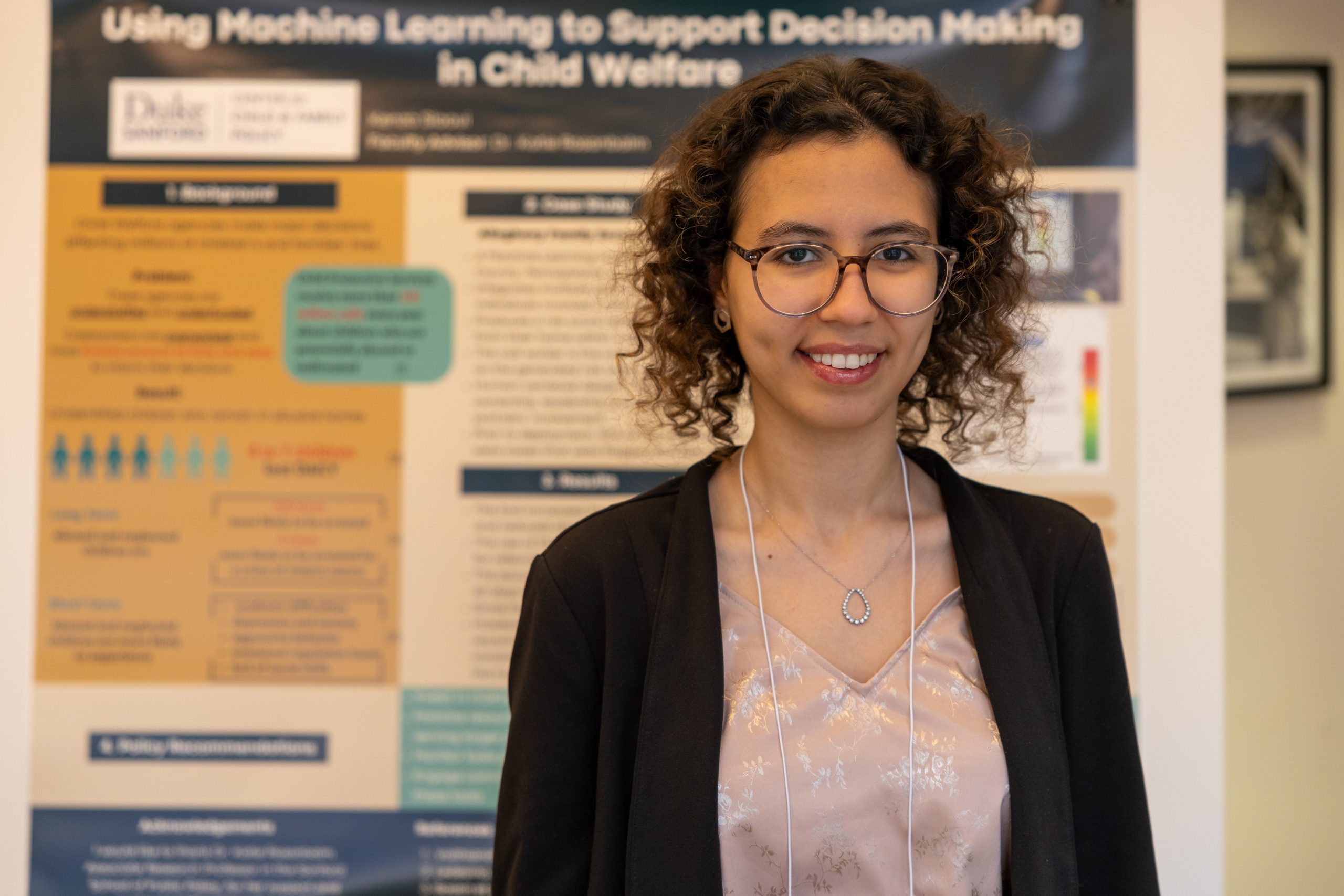
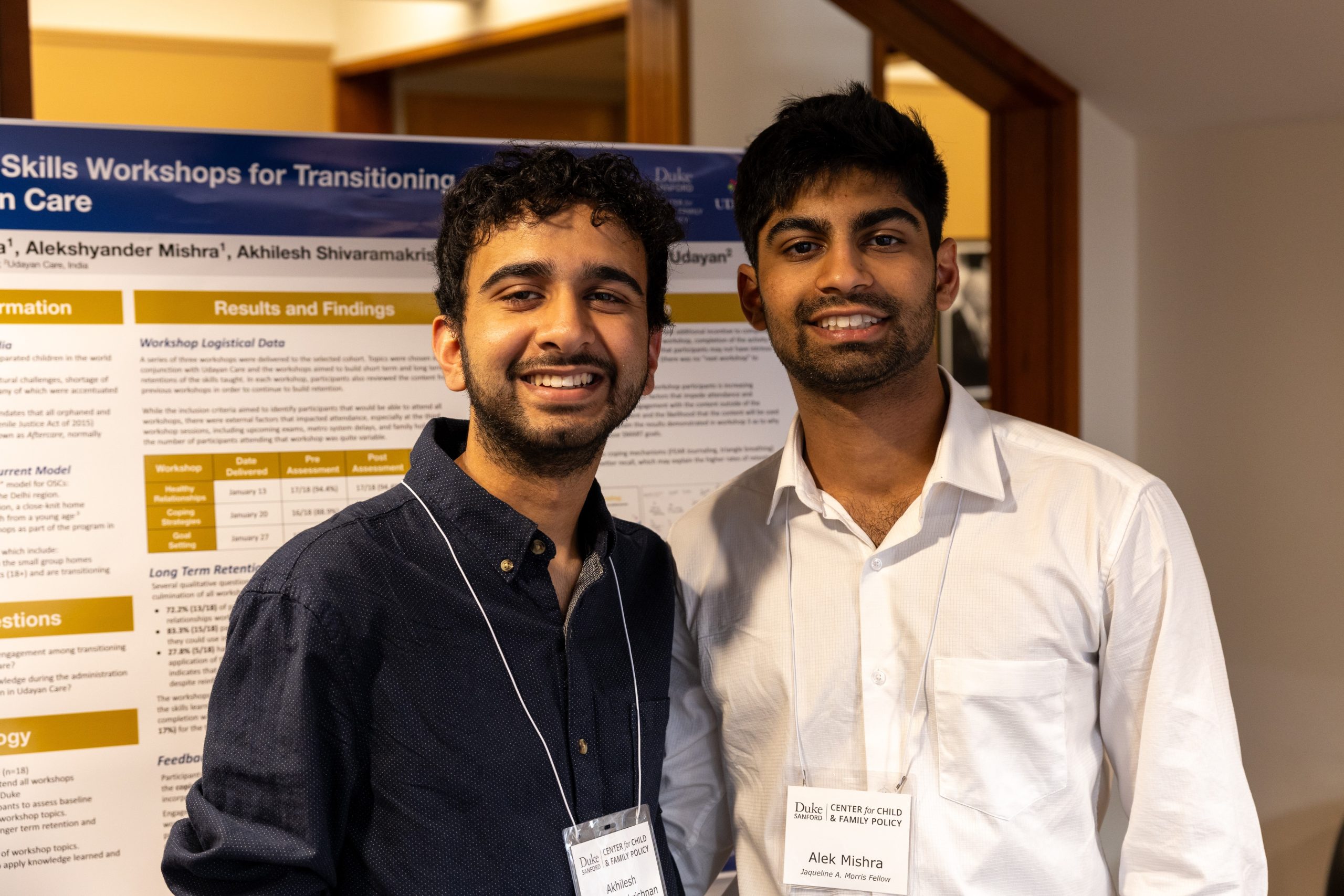
The event allowed our team to present to various stakeholders that work in the child policy space both in the Sanford and greater Durham community. We are super appreciative of all that the Morris Fellowship and CCFP has done and we are excited to continue working with the Center in some capacity in the future!
Akhilesh Shivaramakrishnan and Alek Mishra, Jacqueline A. Morris Fellows '25
I had the best time presenting at the research partnership dinner! I really cherished the opportunity to share our work with so many interested educators across Duke and Durham.
Alissa Rivero, Jacqueline A. Morris Fellows '25
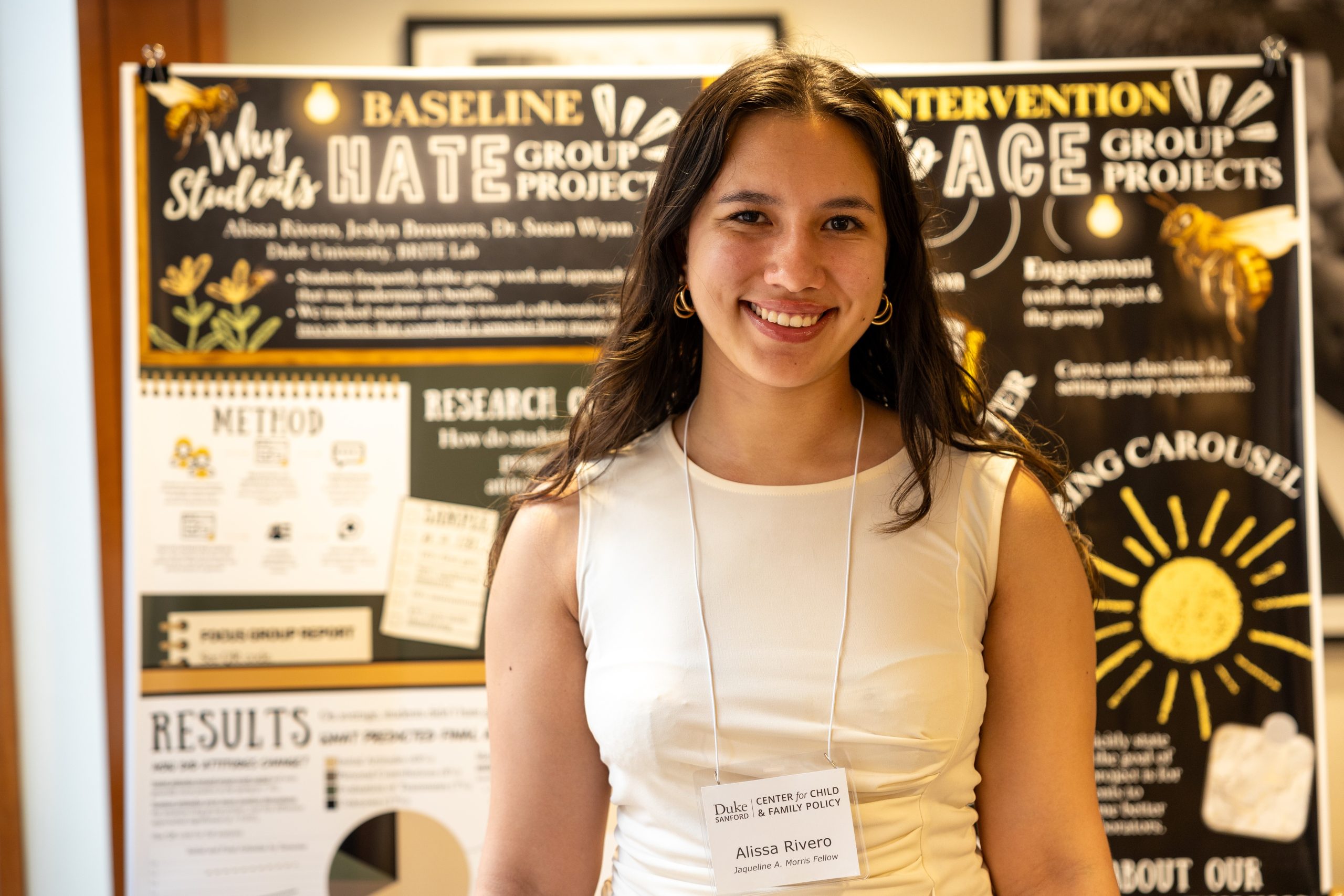
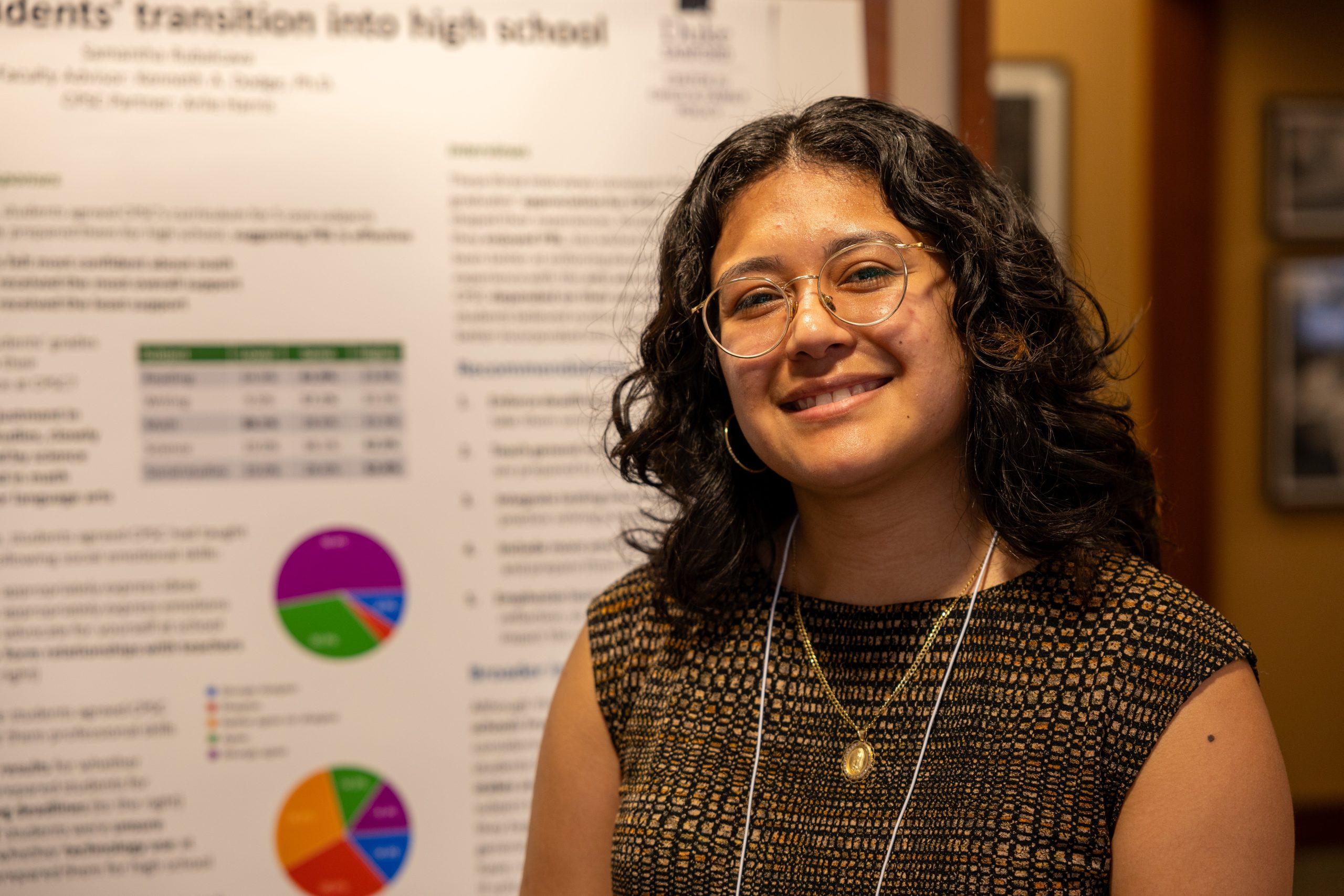
Presenting at the School Research Partnership event was very fulfilling! This experience brought me full circle, as I was able to see how my work would be received by local leaders in early care and education!
Samantha Rubalcava,Certificate graduate '24
America’s childcare crisis is taking another turn for the worse, now impacting a new group of parents. The employment gap between those who have a four-year college degree and those who don’t is growing larger, which is impacting how parents are seeking out childcare.
[Benforado] inspired me to continue advocating for the cause of putting children first.
Minjee Kim PPS '25
Dr. Adam Benforado, professor of law at Drexel University, discussed the importance of prioritizing child wellbeing in public policy as part of the Robert R. Wilson Distinguished Lecture series on March 7, 2024. Benforado was welcomed by the Duke Centennial, the Sanford School of Public Policy, and the Center for Child and Family Policy.
Benforado began by providing an overview of the history of children’s rights in the U.S. to show that recent improvements in child wellbeing fall short of expected progress, given the explosion of technology, knowledge, and wealth over the last 100 years. He pointed to particular areas of concern, including the recent movement to weaken child labor laws in many states and the still-common practice of treating teenagers like adults in the criminal justice system, despite teenagers not being granted the same rights as adults. Benforado also pointed to other countries as benchmarks, noting that the U.S. remains one of three countries, along with Somalia and South Sudan, that have not ratified the Convention on the Rights of the Child, which protects the rights of children 18 or younger.
Benforado emphasized that this was not simply a matter of morality—a failure to ensure child wellbeing today has significant negative impacts on our future economy and society. In the face of such troubling developments, he argued that the purpose of law should be to prioritize the interests of children—not just in children’s issues like education and foster care, but in all areas of law. Doing so, Benforado explained, could remind us of our values and present a more cost-effective way to create the society we want.
Benforado argued that prioritizing youth could also allow us to be more proactive in policy and lawmaking, since children are essentially the canaries in our coal mines. Because children are more sensitive to various hazards, zeroing in on their wellbeing could help us intervene earlier during the critical window of opportunity in childhood, with major benefits for everyone. For example, when considering issues of climate change, water safety or infrastructure, if the wellbeing of children were prioritized, the policy and legal outcomes would be considerably different. Benforado recognized that restructuring the legal system to put children first may feel radical, but he explained that current legal movements such as originalism, were similarly radical when they were conceived. He argues that “children first” is as valid as any other basis for legal and political decision making. He expressed his hopes that this talk and his book, A Minor Revolution, encourage people to think big and push for more ambitious goals.
As a student pursuing the Child Policy Research Certificate at the Center for Child and Family Policy, I appreciated hearing such an inspirational call to action. When I explain my studies to friends and family, I have found that many seem to think of children’s matters as separate from the “bigger issues” facing society. That is evident in Congress as well, where children’s rights are not at the forefront of many of the bills being discussed. But, as Benforado shared with us during his lecture, it is impractical to think of youth as separate from the rest of society.
Benforado’s discussion of children’s rights in the criminal justice context was particularly relevant to me. For the past two years, I have been part of a Bass Connections team exploring trauma-informed approaches to juvenile justice and, as part of our research, I have observed juvenile court proceedings and talked to various actors in the juvenile justice system. Throughout the talk, Benforado explained how promoting the wellbeing of youth used to be seen as a collective goal, but over time, the task of raising children has become the sole responsibility of parents. This reminded me of how, since the late twentieth century, parents continue to be charged exorbitant fees for their children’s incarceration. This policy began under the belief that parents were trying to shift the responsibility of disciplining children to the government. For many parents who are charged these fees, it feels like the government is rubbing salt into the wound of having their child detained for a prolonged period of time. I am sure that Benforado’s message about the collective project of raising the next generation resonated with the future policymakers who attended the event. It certainly inspired me to continue advocating for the cause of putting children first.
Minjee Kim is a junior majoring in Public Policy with a minor in Global Health and a certificate in Child Policy Research. She hopes to pursue a career in law advocating for evidence-based reform.
By Minjee Kim, PPS '25
On February 16, 2024, the Center for Child and Family Policy welcomed two panelists, Libby Doyle, current Duke MPP student and former researcher analyst with the Urban Institute, and Emilia Sotolongo, senior technical assistance analyst at Child Trends. They sat down with a group of undergraduate and graduate students and talked about their experiences working at think tanks. The speakers shared how they began doing policy work, memorable projects, where they see the industry heading, and tips for pursuing a career at a think tank.
During the talk, Doyle explained how she became interested in criminal justice reform after studying the death penalty in college. She knew she did not want to do research for the sake of research, so she began working as a research assistant at the Urban Institute’s Justice Policy Center. Doyle’s work took her all over the country, but she found that locally based projects allowed her to interact more directly with people than federal contracts. As a result of her time at the Urban Institute, Doyle’s interests have shifted more toward local government initiatives. She now works as a research fellow for the City of Durham to support the new HEART mental health crisis response program.
Sotolongo, on the other hand, talked about her “less traditional track” to a think tank. She started her career as a middle school teacher in the Durham Public School system. Although she had originally wanted to be a direct practitioner, she began feeling burnt out. That led Sotolongo to start pursuing a career more rooted in research, and she worked as a senior research aide for the Center for Child and Family Policy before joining Child Trends. Now, Sotolongo focuses primarily on qualitative research at Child Trends, where she manages projects and conducts interviews with various stakeholders. She continues to draw on her experience as an ESL teacher to guide her research involving immigrant and refugee youth.
Doyle and Sotolongo described some similarities between their respective think tanks. As a whole, think tanks focus on actionable research, and both speakers appreciated being able to see the direct and indirect impacts of their work. Think tanks also produce deliverables on a quicker timeline and for a wider audience than academic research. The policy briefs and memos created by think tanks, however, are often not accessible to a lay audience. Doyle noted that think tanks are making an effort to develop more innovative methods to disseminate information—at Urban, for instance, there is a Research to Action Lab that focuses on translating research into workable information.
As a student considering various policy internships for the summer, I appreciated hearing firsthand what it was like to work at a think tank. Although I had known about think tanks for a while, it had been hard for me to conceptualize what exactly the day-to-day looked like. Both speakers helped clarify, through specific examples from the projects they had worked on, just how wide the range of tasks and policy areas could be. I have always wanted to be involved in policy research while also still being on the ground, engaging with the community, so I was also excited to hear that think tanks have been moving toward more inclusive practices, such as participatory research. Doyle and Sotolongo provided valuable insight into the opportunity for growth and exploration for early career professionals at think tanks.
Minjee Kim is a junior majoring in Public Policy with a minor in Global Health and a certificate in Child Policy Research. She hopes to pursue a career in law advocating for evidence-based reform.
By Phoebe Ducote, PPS '25
On January 19, 2024, the Center for Child and Family Policy (CCFP) welcomed panelists from three nonprofit policy organizations for its Exploring Careers in Child and Family Policy Speaker Series. Neil Harrington from NC Child, Brennan Lewis from Equality NC, and Elizabeth Paul from the Public School Forum of North Carolina gave students insight into working at nonprofit policy organizations. The panelists shared how they landed their current positions, what they enjoy and find challenging about advocacy work, and tips for pursuing non-profit policy careers.
- Neil Harrington is the current research director for NC Child, where he works on issues including early care and education, child health and safety, and family economic security.
- Brennan Lewis works as an education policy associate at Equality NC, supporting and implementing education policy strategy to improve school environments, create stronger advocates for LGBTQ youth, and inform inclusive school board policies and state laws.
- Elizabeth Paul is the policy and research manager at the Public School Forum of North Carolina, where she leads research, advocacy, and publication work focusing on school finance and student outcomes.
The speakers began by acknowledging that it can be hard to identify opportunities because child and family policy nonprofits are typically small, and one must seek them out. The panelists talked about looking for how their interests intersected with different non-profit policy organizations to identify places they would be interested in working. Each had different pathways into child policy, including starting in political campaigning, working internships while in school to make connections, and networking with friends.
Listening to the panelists talk about their work opened my eyes to opportunities I had not thought much about. As Duke students, we often aim for the highest level of whatever we want to pursue. For most students in policy work, that means aiming to work in DC. However, as the panelists talked, it was clear how much policy work happens at the state and local level. Many students overlook this level of policy work because of our own bias to the “size of the work.” The panelists highlighted how many policies are determined by states, counties, and cities, and how one’s work can have direct, tangible impact at this level.
Policy change happens where there’s opportunity. Part of this work is recognizing that the (political) window is sometimes closed. And during that time, it is just as important to hold on to the work, so you do not fall behind.
Elizabeth Paul
When they talked about their work, one thing that stuck with me was they all talked about how working in advocacy can be a struggle at times because policy change is impacted by so many factors. Elizabeth Paul spoke about this, explaining that “policy change happens where there’s opportunity. Part of this work is recognizing that the (political) window is sometimes closed. And during that time, it is just as important to hold on to the work, so you do not fall behind.”
For me, one of the most impactful parts of the panelists’ discussion was when they talked about their academic paths and the importance of taking time to figure out what you want to do. When asked about their decisions to pursue an MPP rather than attending law school, two panelists highlighted the importance of taking time after a bachelor's degree to figure out how to “create change for yourself and allow yourself to think about what your next steps will be.” This opened my eyes to a world beyond the common Duke student path of going straight to graduate school and helped me realize the importance of introspection regarding my own educational path.
These perspectives and conversations are exactly why the Center for Child and Family Policy offers these speaker series and opens the opportunity to receive invaluable glimpses into different careers within child and family policy. The panelists’ shared experiences provided a rich overview of the complexities and rewards of pursuing a career in nonprofit and advocacy while underscoring the necessity of perseverance, creativity, and strategic thinking within policy advocacy. This inspired reflection on leveraging personal and academic experiences toward meaningful employment opportunities and provided helpful advice for every student contemplating careers in public policy.
 Phoebe Ducote is a junior majoring in Public Policy (B.A.) with a minor in Education and a certificate in Child Policy Research. She is getting her teaching license and is planning on attending law school.
Phoebe Ducote is a junior majoring in Public Policy (B.A.) with a minor in Education and a certificate in Child Policy Research. She is getting her teaching license and is planning on attending law school.

Learn more about Ann's work in our CCFP Community Spotlight below.
What were you doing prior to CCFP?
For about nine years before I came to Duke I worked as a special education teacher and supervisor for students with behavioral and learning challenges. I worked in the Chapel Hill-Carrboro City Schools for a bit, but most of those years were with a residential wilderness program for youth with court involvement in Rhode Island and North Carolina. I also helped facilitate re-entry of those students back into their home school districts.
What have you spent most of your time on recently, in terms of research?
I am honored to be working on a new project collecting data in Ukraine. Along with a wonderful colleague in Lviv and her team across Ukraine, we are collecting data from adolescents, young adults, and their parents. We have connected with five universities throughout the country to examine both risk and protective factors in their lives, including their individual experiences, their family relationships, and the larger community stressors stemming from their war experiences, which vary across the country. In just two months, over 1,500 young people and many of their parents across Ukraine have joined the study and completed the survey. We have also received hair samples from youth so that a future project can examine biological stress markers, which in turn are linked with many health outcomes. One interesting thing about the survey we are using is that we capture a lot of young people’s experiences not just with anxiety, moral injury, and PTSD, but about the strategies they are using to cope, their feelings of hope and optimism, and whether they feel they are experiencing post-traumatic growth.
My hope is that this project can inform recovery efforts in Ukraine and other places where traumatic experiences have impacted individual safety, adolescent and young adult development, and relationships.
What do you consider your greatest recent accomplishment while working at CCFP? Or, what are you most proud of in terms of your work and research at CCFP?
I love being able to build new international relationships with researchers around the world. Working with people in my field, who view development and adjustment through different cultural lenses is such an important part of what motivates the work I do. I have been fortunate to be part of a few fellowships and small projects that have allowed me to meet researchers in many countries and work with them to collect new data, or analyze existing data through a new framework.
What do you enjoy most about working at CCFP?
One of the things I love about CCFP is that I have a lot of people I can talk to with different areas of expertise and experience. It is hard to find a truly collegial community and such diverse talents who are willing to talk through challenges with you.
What was your first-ever job?
My first official job was working in our local library during high school. I would go to work after track practice and shelve books until the library closed. For a long time, my resume read: “Job title: Shelver. Job duties: Shelved books." I’m glad to be doing something a lot more exciting these days!
What’s your favorite book?
It’s hard to pick a favorite book, but I recently (and finally!) read The Nightingale by Kristin Hannah and stayed up far too late to finish it. The writing and the storyline were so compelling.
What’s something that most people probably don’t know about you?
While I was an undergraduate, I worked as a server at a colonial tavern in Williamsburg, VA, complete with 18th-century costume. During my senior year, a group of us were hired to be in a commercial to advertise Colonial Williamsburg, but I never got to see if our scenes ever made it to television.
Four newly released research briefs, Parent and Provider Voices on Early Care and Education in North Carolina, present parents’ and providers’ insights into the strengths, needs, and ideas for improvement on four topics:
- All Aboard: Parent and Provider Feedback on Meeting Early Care and Education School Readiness Goals
- Building Resilience: Nurturing Social and Emotional Health in Young Children
- Family Perspectives on Availability and Affordability: Improving Access to Quality Early Education
- The Seeds of Success: Investing in Early Childhood Workforce
Parent and provider perspectives come from 18 focus groups comprised of more than 250 diverse parents and child care providers from across the state, including both rural and urban/suburban counties. Focus groups were conducted by the Center for Child and Family Policy, in partnership with the Hunt Institute, as part of the 2023 update to the North Carolina’s Preschool Development (Birth Through Five) Needs Assessment. Development of these briefs was supported by the Blue Cross and Blue Shield of North Carolina Foundation.
On November 30, I watched the recorded video of the presentation, Revealing the Legacy of Poverty in America, which featured leading poverty researchers Kathryn Edin, William Church Osborne Professor of Sociology and Public Affairs; and Timothy Nelson, lecturer in the Department of Sociology, both at Princeton University. They presented findings from their new book, “The Injustice of Place: Exposing the Legacy of Poverty in America.” The speakers began with the index of deep disadvantage, an introduction to the definition and dimensions of poverty, and then described the mechanisms by which types of poverty are created in the context of the various regions of the United States. The authors pointed to separate and highly unequal schools, loss of social infrastructure, violence, corruption, systemic racism in government policy, elite backlash, and social reproduction as causes of poverty in the United States.
As a Chinese international exchange student in the U.S., my impression of the U.S. has always been synonymous with Silicon Valley or cutting-edge technology, and this glamorous side of the U.S. caused me to overlook the fact that there is a gray part in any society. While it’s widely acknowledged that the U.S. is one of the wealthiest countries globally, it's hard to fathom that it also ranks among the nations with the most significant wealth disparity. When compared to the 30 countries in the Organization for Economic Co-operation and Development, a notable finding is that on a key measure of income equality—the Gini coefficient[1]—the U.S. ranked higher than all member countries except Bulgaria, Turkey, Mexico and Costa Rica in recent data. Inequality in the distribution of wealth is more pronounced in Costa Rica and Mexico, but the U.S., as a mature, developed country, is very close to them in terms of inequality, reflecting the political and economic institutions behind the growing inequality in the United States.
The speakers focused on investing in social infrastructure and rooting out corruption as the solution to poverty in the U.S., which reminds me of China's well-lauded and highly successful solution to poverty: the targeted poverty alleviation policy, which focuses on tailoring assistance to specific individuals and regions in need, aiming to lift people out of poverty through precise and customized measures. However, this approach may not work in the United States. This is not only due to the plurality of U.S. politics, the diversity of political parties, and the complexity of regulations, which make it difficult for all levels of government to pursue and follow through on the same policies, but it may also reflect the U.S. culture of individualism, which may lead some to object to over-centralized government assistance, believing that it may diminish the efforts and responsibility of the individual.
Overall, I’m so honored to have had the opportunity to hear such a contextualized analysis of poverty in the U.S., which has given me more comparative thinking about poverty and inequality in a world context.
[1] The Gini coefficient is based on the comparison of cumulative proportions of the population against cumulative proportions of income they receive, and it ranges between 0 in the case of perfect equality and 1 in the case of perfect inequality. More information available at https://data.oecd.org/inequality/income-inequality.htm. OECD (2023), Income inequality (indicator). doi: 10.1787/459aa7f1-en (Accessed on 20 December 2023)
 Chloe (Jingwen) Zeng is a junior exchange student from Duke Kunshan University majoring in Public Policy Studies (B.A.) with institutions and governance major. She is interested in the role of public sectors in social inequity, with a focus on education policy.
Chloe (Jingwen) Zeng is a junior exchange student from Duke Kunshan University majoring in Public Policy Studies (B.A.) with institutions and governance major. She is interested in the role of public sectors in social inequity, with a focus on education policy.
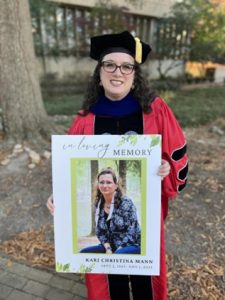
In this CCFP Community Spotlight, hear more from Jen about her background, her graduation from her Ph.D. program, the recent loss of her mother, and how she thinks about her work with CCFP.
What was your first job ever?
I guess I could say I started my career in education at the age of 14, with the start of my very first tax-paying job. My mom had found out about a job training program for students from low-income families. They would teach us marketable skills and general life skills during a two-week paid training, then provide us with a summer job. They placed me in my former elementary school, where I supported the administrative staff through answering phone calls, making copies, organizing documents, and doing other similar tasks. I would later return to my elementary school at the age of 17 as part of a teacher cadet program, where I spent half days during my senior year being trained in how to write lesson plans, teach students, and grade papers.
What were you doing prior to CCFP?
I spent thirteen years in the K-12 classroom before leaving to work on my Ph.D. in teacher education and learning sciences at NC State. I loved being a teacher, and I pursued my Ph.D. out of a desire to improve the quality of education that students receive. My focus has been specifically on immigrant- and refugee-background students for whom there are tremendous opportunity and achievement gaps.
Since working at CCFP, I have completed my dissertation, defended it, and graduated! This accomplishment is made even more significant to me for two reasons. I am the first person in my family to ever graduate from college—obtaining my Ph.D. far exceeds any dreams my family had for me. Secondly, my mom dropped out of tenth grade to give birth to me and her education ended at that point. When I look at my own journey, it is a direct extension of hers. The day after my dissertation defense, my mom's heart unexpectedly failed. I never would have imagined that my last conversation with my mom would have been to tell her that I'm now Dr. Jennifer Mann, and to hear her tell me, "This is the greatest thing that's ever happened to our family."
I look at my current work at CCFP as a way to continue making my mom proud and honoring the many sacrifices she made to make the life I have a possibility. Through my work, I can help make education better and more accessible to so many students. I have the opportunity to impact systems that help improve their likelihood of continuing their own educations. I consider it a great privilege to work for Duke University and work alongside such a compassionate group of individuals at CCFP.
On October 19, Kathryn Edin, Timothy Nelson and Liv Mann of Princeton University presented the Sulzberger Distinguished Lecture, "Uncovering the Legacy of Poverty in America." The lecture drew on findings presented in Edin and Nelson's new book, The Injustice of Place: Uncovering the Legacy of Poverty in America.
Edin is the William Church Osborn Professor of Sociology and Public Affairs at Princeton, and Nelson is a lecturer in the Department of Sociology. The authors were joined by Mann, a fifth-year Ph.D. student in sociology and social policy at the university.
Their discussion commenced with a powerful quote, "Turning our lens from people to places." This quote encapsulated the central theme of their research, challenging the prevailing focus on individuals in poverty to instead consider how the geographic context of their upbringing significantly influences their experience of poverty in the United States.
As someone from Charlotte, North Carolina, where issues of poverty and inequality are often at the forefront of community discussions, I found this new outlook to be refreshing and thought-provoking. The talk shed light on the pressing concerns faced by communities like mine and emphasized the importance of addressing not just individual challenges, but also the systemic and environmental factors that perpetuate poverty. Throughout the talk, Edin, Nelson, and Liv Mann, a team ethnographer, identified five distinct clusters of high disadvantages, primarily concentrated in the Southern United States, particularly in rural areas.
These areas are typically marked by significant challenges, limitations, and difficulties in various aspects of life, such as economic opportunities, education, healthcare, infrastructure, and social well-being. It's intriguing to observe how these communities can become interconnected in a perpetual cycle of poverty, influenced by factors like the loss of social infrastructure, violence, corruption, unequal schools, systemic racism, and elite influence.
However, amid the challenges and adversities, there was a glimmer of hope. Edin and Nelson pointed to individuals who had left these communities, gained education and expertise, and were determined to return and make a positive difference. These individuals were the potential catalysts for change in these disadvantaged regions. In conclusion, the talk reinforced the idea that addressing the legacy of poverty in America requires a multifaceted approach that includes investing in social infrastructure, rooting out corruption, and fostering hope for a better future. Edin and Nelson's work serves as a poignant reminder of the importance of understanding the historical context and the underlying mechanisms that continue to shape the lives of those living in areas of deep disadvantage.
Nya Williams is a junior majoring in Public Policy Studies (B.A.) with minors in Political Science and Economics on the pre-law track. She is interested in the intersection of policy and law, with a focus on education.
Lola James is a first-year dual Master of Public Policy and Master of Business Administration candidate at Duke. She recently joined the CCFP community, working as a research assistant with Katie Rosanbalm on the North Carolina Resilience and Learning Project, which supports trauma-informed education in schools across the state.
Learn more about Lola in our CCFP Community Spotlight Q&A below.
What were you doing prior to CCFP?
I was the program manager for a non-profit called The Young African Bookworms Initiative, which helps marginalized children in Northern and Western Nigeria access quality education. The non-profit is the social impact initiative of Noah’s Ark, a top advertising agency in Nigeria.
One of the programs I introduced at the Young African Bookworms Initiative was a social-emotional learning program called the Paragon Training Club. It teaches children coping and resilience skills such as empathy, kindness, mindfulness, respect for other’s opinions, and how to speak up when someone is being oppressed. It’s like lighting a candle in a child so that they can light the next candle and the next.
What made you interested in pursuing your master’s degree at Duke?
CCFP first informed my decision to choose Duke because the Center’s Resilience and Learning Project aligned exactly with what I was doing back home, which was introducing a trauma-informed approach to the learning experience in underserved schools.
A second factor in my decision was the fact that I can get two graduate degrees in three instead of four years. Having worked in non-profits all my life, I felt the need to understand how social impact can be sustained in ways that benefit stakeholders in all sectors of an economy. Since I already have the heart for social impact, the MPP/MBA program will help me develop the hand for public policy and the head for business. This way, I’ll be a tri-sector leader working with all sectors to make lasting changes in the lives of people.
I was introduced to Duke by one of my professional mentors, who happens to be the Chairman of World Connect, an American non-profit that funded some of our non-profit’s programs in Nigeria. After I learned of the Duke program, I looked through the website, and the first thing that made me realize that this was where I wanted to be was CCFP, because I connected immediately with the Resilience and Learning Project.
How did you connect with Katie Rosanbalm?
I connected with Dr. Rosanbalm for the first time in April via her email on the CCFP website. She was excited to learn that we had a socio-emotional learning program like hers at a non-profit in Nigeria. We set up a virtual meeting two weeks after exchanging a couple of emails. Dr. Rosanbalm encouraged me to reach out as soon as I came to Duke, and that was exactly what I did. In fact, she was the first Duke professor I met after I arrived in the U.S. Our first in-person meeting was amazing. We were literally finishing each other’s sentences and affirming each other’s experience with the trauma-informed programs we ran, albeit on different continents.
The Resilience and Learning Project is exactly like what we were doing at The Young African Bookworms in Nigeria, through the Paragon Training Club. The Club is an afterschool program with essentially the same model – creating more trauma-informed schools and giving children skills to cope with their anger, changes, fears, and whatever trauma they have gone through. Giving kids effective tools to thrive – I hate the term ‘survive’ – to thrive in those kinds of settings.
It is exciting that there could be so much learning both ways – that I could learn so much about what’s working with this CCFP program and help my team incorporate it back home. But also, that I can share experiences from Nigeria that could also improve the Resiliency and Learning Project here.
What are you most excited about in terms of the research you’re participating in at CCFP this year?
I’m excited about the fact that I get to contribute. Learning goes both ways and there are lessons I can share from the program back home. Right now, I’m working on developing surveys to help us monitor and evaluate the Resilience and Learning Project in the past year.
I am also excited about the chance to be part of a child’s success story. The fact that today’s child will be tomorrow’s adult with a positive experience. The adult can look back at his childhood and think, “If I didn’t develop those coping skills, my story could have been different, and the outcome might have been worse. I know how to handle anger... I know how to handle stress... I know how to handle pressure.” That’s what keeps me going.
What are you hoping to do after you complete your master’s degrees?
I intend to work in social impact consulting where I can help companies identify opportunities to sustainably solve social impact problems that increase their financial bottom line at the same time.
What’s the best advice you’ve ever received?
It was from my mom when I was about 7 years old. She said, “When you borrow something from someone, return it in a better condition than they gave it to you so that they look forward to lending it to you next time.”
In my work life, I apply my mom’s advice by intentionally leaving my jobs or companies better because I was there. In my relationships, I am deliberate about leaving people better than I met them.
What do you like to do in your spare time?
I read self-help books and I like to watch romantic comedies and documentaries. I also like to host friends for home-cooked meals, board games, and interesting conversations.
Do you have a favorite movie?
Pretty Woman all the way. I could watch that movie a million times.
What’s something that most people at CCFP probably don’t know about you?
That ‘Lola’ is the last four letters of my 15-letter name. My actual name is Oluwafunmilola, a Yoruba name that means “God gave me wealth.”

 Phoebe Ducote is a junior majoring in Public Policy (B.A.) with a minor in Education and a certificate in Child Policy Research. She is getting her teaching license and is planning on attending law school.
Phoebe Ducote is a junior majoring in Public Policy (B.A.) with a minor in Education and a certificate in Child Policy Research. She is getting her teaching license and is planning on attending law school.
 Chloe (Jingwen) Zeng is a junior exchange student from Duke Kunshan University majoring in Public Policy Studies (B.A.) with institutions and governance major. She is interested in the role of public sectors in social inequity, with a focus on education policy.
Chloe (Jingwen) Zeng is a junior exchange student from Duke Kunshan University majoring in Public Policy Studies (B.A.) with institutions and governance major. She is interested in the role of public sectors in social inequity, with a focus on education policy.